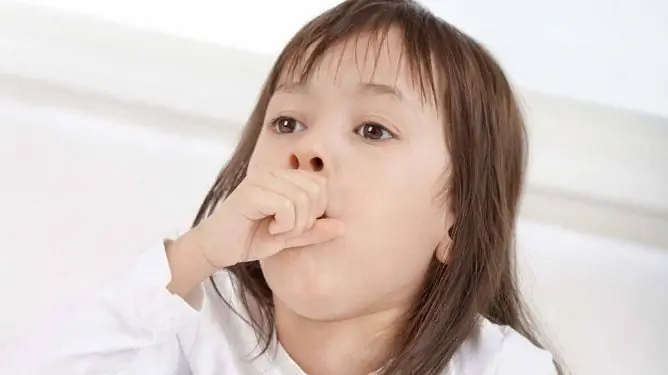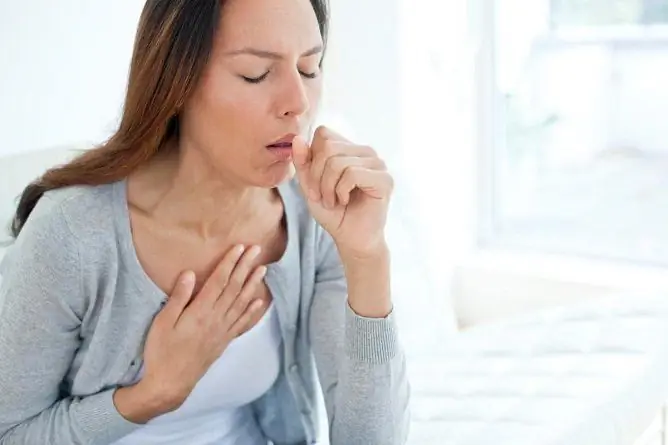- Author Rachel Wainwright [email protected].
- Public 2023-12-15 07:39.
- Last modified 2025-11-02 20:14.
How to treat ARVI: effective remedies for the prevention and treatment of colds
Everyone is used to dealing with colds in their own way. Someone is treated exclusively with folk remedies like garlic or raspberry jam and tea with lemon, while someone entrusts their health to the achievements of modern pharmaceuticals.
However, it is worth looking at the pharmacy shelves filled with various drugs, and the second question arises: which drugs are effective and in which case? No one wants to take useless drugs.
Let's see what means for the treatment of ARVI and the prevention of colds exist.
What is included in the category of "cold remedies"?
Many cold remedies are approved for sale without a prescription. But despite this, the most correct first step when you get sick is to see a doctor who will determine the nature of the disease and prescribe the optimal treatment regimen.
However, this does not mean that knowledge about cough medicines is unnecessary. Sometimes it is impossible to get to the doctor for various reasons. In addition, some drugs and agents can be used to prevent ARVI, which is always preferable to treating the disease.
Anti-cold remedies include drugs of several groups:
- immunostimulants;
- antibiotics;
- antiviral;
- symptomatic remedies.

Immunostimulants
Immunostimulants are synthetic or natural drugs that act on the body's immune system by enhancing the response of immune cells (what is commonly referred to as "boosting immunity"). Immunostimulants are immunomodulatory agents, which is why these names are often used interchangeably. But, strictly speaking, immunomodulators are a broader class of drugs that also include immunosuppressants for the treatment of a number of autoimmune and other diseases.
Immunostimulating drugs include: therapeutic vaccines, interferons, biologically active peptides, interleukins, and some others. The most popular in our country are drugs based on interferons - special proteins that are produced by our immune cells in response to a virus. Although interferon does not have a direct antiviral effect, it is capable of causing changes in cells that prevent the virus from multiplying, the formation of viral particles and the further spread of infection. Cells adjacent to a virus-infected cell become immune to the virus, which stops it from multiplying and spreading in the body.
Despite the immense popularity of immunostimulants in our country, their use is not always justified, especially when it comes to a simple cold. The immune system is able to cope with most threats on its own and does not need additional "spur".
The attitude of doctors to immunostimulants is ambiguous. First, the effectiveness of many advertised drugs is questionable. Secondly, with a common cold, artificial stimulation of the immune system is necessary only if the latter really has problems. Otherwise, it is possible, on the contrary, to provoke the development of autoimmune pathologies. Thirdly, there is an opinion that the uncontrolled intake of immunostimulants is one of the probable reasons for the increase in the prevalence of cancer.
Immunostimulants should only be prescribed by a doctor, as the combination with other medications can lead to side effects. For example, if you use interferon in the form of a nasal spray together with nasal drops (vasoconstrictor drug), dryness of the mucous membranes may occur, up to a burning sensation.
It makes sense to use immunostimulants for the prevention of ARVI only if a person has been diagnosed with problems associated with suppression of immunity. The fact is that it is impossible to constantly keep the immune system in a state of "high alert", this depletes the body's own forces and can cause serious malfunctions in the immune system.
It is noteworthy that outside the CIS countries, immunostimulants are recommended mainly for the treatment of secondary immunodeficiency and are not dispensed without a doctor's prescription. In Russia, the sales of this group are second only to sales of antibiotics and oncological drugs.

Antibiotics
Antibacterial drugs inhibit the development and spread of pathogenic bacteria. It is clear from the definition that it is pointless to fight with antibiotics against a viral infection, since viruses do not belong to bacteria. Bacteria are microorganisms with a cellular structure, and viruses are non-cellular agents that need to enter the cell of another organism to reproduce.
Antibiotics can only be prescribed by a doctor if the cold is of a bacterial nature or a secondary bacterial infection has joined the viral disease. Remember that self-medication with these drugs does more harm than good. In addition to the absolute ineffectiveness of antibiotics in the fight against viruses, the chaotic intake of one or another antibiotic causes the resistance of bacteria to the active substance. We must not forget about the whole "bouquet" of side effects, as well as the possible transition of the disease into a chronic form with the wrong drug and non-compliance with the recommended scheme of use. Taking antibiotics only as directed by a doctor is also necessary because, when combined with other drugs, the active substance can reduce their effectiveness, act worse itself, or show side effects.
It is also important to remember that antibiotics are meaningless both for the prevention of ARVI and for the prevention of bacterial complications. In the first case, viruses "will not pay attention" to the presence of antibiotics in the body. In the second case, bacteria will have a better chance of adapting to the antibiotic, or "conquering" the body when the antibacterial drugs are stopped. Thus, it is impossible to take antibiotics "just in case" to prevent ARVI, its complications or shorten the duration of the disease.

Antiviral drugs
Direct-acting antiviral drugs are used directly to treat and, in some cases, prevent viral infections.
It is important to remember that there are no “broad spectrum” antivirals. Each antiviral drug is effective against any particular virus and is not useful against other viruses. For example, acyclovir works against the herpes virus but is not useful against the influenza virus.
Antiviral agents are distinguished by the stage of the life cycle at which they act on the virus:
- protection against the penetration of the virus into the cell;
- counteracting the multiplication of the virus inside the cell;
- blocking the release of viral copies from the cell.
Among the most popular antiviral agents for influenza are Tamiflu, Remantadin and others. They act on the influenza A virus.
The main problem in the creation of effective antiviral agents for ARVI is the variety of forms and mechanisms of viral reproduction. In addition, viruses mutate successfully, quickly adapting to new environmental conditions and new drugs. Besides, there are many viruses! There are about 200 known viruses that cause only SARS. Therefore, there is no universal “magic pill” for ARVI among these drugs.
When prescribing one or another antiviral agent, the doctor takes into account the current symptoms, age, condition, the presence of other diseases and other factors. Therefore, buying a drug "on advice" or advertising may turn out to be useless, not to mention the restrictions on age, health status and other parameters.
It is significant that the situation with the non-prescription dispensing of antiviral drugs in our country and abroad is similar to the situation with immunomodulators.
Although direct-acting antivirals are also suitable for prevention, they will only protect against certain types of influenza viruses.
Means for symptomatic treatment
As the name suggests, these drugs do not fight the cause of the disease, but its obvious manifestations - a runny nose, cough, high fever, and so on. Such remedies alleviate the condition, but do not eliminate the cause, that is, the virus. But they make it easier for the body to tolerate the disease and "free up" forces to fight infection.
There are means of different actions: antipyretic, against the common cold, pain relievers and others. But it must be remembered that antipyretic drugs are recommended to be taken only at a really high temperature, 38.5 ° C, and the temperature "knocked down" by the pill does not mean complete recovery.
The most popular antipyretics - based on paracetamol and ibuprofen, can even be given to children. Doctors strongly advise against "knocking down" the temperature of children and adolescents under 16 years of age with aspirin, since the use of acetylsalicylic acid in a viral infection can provoke the development of Reye's syndrome (sudden nausea and indomitable vomiting, accompanied by a change in mental state: lethargy, disorientation, agitation or coma, convulsions, drowsiness).

ARVI prevention: vaccination and essential oils
Whatever the achievements of modern medicine, it is better to prevent the disease, and not to deal with its treatment later. Moreover, prevention is important if you or your loved ones are particularly susceptible to infections during the period of massive epidemics of ARVI.
As already mentioned, antiviral agents can be used as prophylactic agents. But in order for them to really work, you need to know which strains of the virus are active in your area this season. It is difficult for a layman to understand such details.
As a preventive measure against influenza, the World Health Organization (WHO) recommends an annual vaccination that is effective against circulating strains of viruses, which will at least ease the course of the disease. According to some reports, such vaccination reduces the likelihood of illness by 2-3 times. Now in Russia they are vaccinated with trivalent vaccination (contains antigens of 2 strains of virus A and 1 strain of virus B). In most countries of the world, tetravalent vaccination is used (2 antigens of viruses A and 2 antigens of viruses B). In the near future, Russia should also switch to a tetravalent vaccine.
The flu shot is indicated for high-risk groups:
- elderly people,
- children under 5 years old,
- pregnant at any stage of pregnancy,
- people suffering from chronic diseases,
- healthcare workers.
Protecting yourself from a possible illness in this way, you need to remember:
- it is advisable to vaccinate in the first half of autumn, and somewhere at the end of summer, that is, before the start of the "cold season", otherwise its effectiveness is significantly reduced;
- influenza vaccination only protects against influenza, so even after vaccination there is a chance of contracting other types of SARS.
Another, long and well-known, way to protect yourself from infection during massive colds is to use essential oils. The antiviral and antibacterial properties of oils make them quite an effective option for home prevention.
The healing properties of essential oils have been known since ancient times. Interest in essential oils as antiviral, antibacterial and antiseptic agents revived in the 20th century, developing in the form of aromatherapy. In the middle of the twentieth century, the aromatogram method was developed to assess the effectiveness of treatment with a particular essential oil.
For the prevention of colds with the help of essential oils, indirect or passive inhalation is used. The advantage of this method is that it does not require special equipment - a piece of cloth or napkin moistened with oil is enough. Such a napkin can be put in the bedroom, nursery, on the work table and inhaled aromatic disinfected air during the day.
In some countries, physicians who practice aromatherapy must obtain appropriate certifications. In addition, some manufacturers are serious about using essential oils for medicinal purposes. For example, products from the "Breathe" series, which is a composition of several natural essential oils, must undergo clinical trials to confirm its effectiveness and safety. The "Breathe" line includes products for both adults and children, including for the prevention of ARVI - in the form of oil, a spray and an inhaler bracelet.
Mint, juniper, clove, eucalyptus, cajeput and wintergreen essential oils, which are part of the "Breathe Oil" composition, have antibacterial, antiviral and anti-inflammatory properties. Spray "Breathe Oil" can be sprayed in the room or on curtains, upholstered furniture. "Breathe Oil" can be dripped onto a napkin and placed next to you, or applied before leaving the house on a scarf or collar of outerwear. For the prevention of colds in children, it is especially convenient to use the Oil complete with a special bracelet-inhaler, which will turn into a personal "purifier" of air. Putting on such a bracelet with a few drops of "Breathe Oil" on the child's hand, you will be sure that he will not lose a handkerchief or napkin with oil and will be under the reliable protection of essential oils at school or kindergarten.on a walk or in public transport.

Prevention of viral infections that do not require drugs
Do not forget about the general rules of prevention during colds:
- Ventilate the apartment regularly, especially if someone is already sick at home. Be sure to ventilate the bedroom and nursery before bed.
- Humidify the indoor air, do wet cleaning regularly.
- Walk in the fresh air more often. It is advisable to walk with children 2 times a day if the temperature outside is from + 30 ° to -15 ° C.
- Wash your hands with soap and water to prevent the spread of infection when walking outside, before eating, or before removing makeup, touching your face, etc. Teach your child not to touch his face and nose with unwashed hands.
- Modify your diet for your increased risk of colds. Drink mineral water - viruses do not tolerate an alkaline environment well. Be sure to include fish, chicken, veal in the menu - animal protein is necessary for the work and formation of immune cells. Do not forget about milk porridge (rice, oatmeal, pearl barley) and low-fat dairy products (cottage cheese, sour cream, milk, kefir, yogurt). Make sure you have enough fruits and vegetables in your diet - better than those your family is used to. Sauerkraut is rich in vitamin C, which is also found in apples and oranges. Carrots, oranges and other orange fruits and vegetables are high in beta-carotene, which is essential for the immune system to function properly. Add nuts, pumpkin seeds and sunflower seeds, or legumes (lentils, peas) to provide the body with zinc, which is required for interferon synthesis. Follow the diet 3-4 times a day.

Take care of your health and the health of your loved ones!
Found a mistake in the text? Select it and press Ctrl + Enter.






